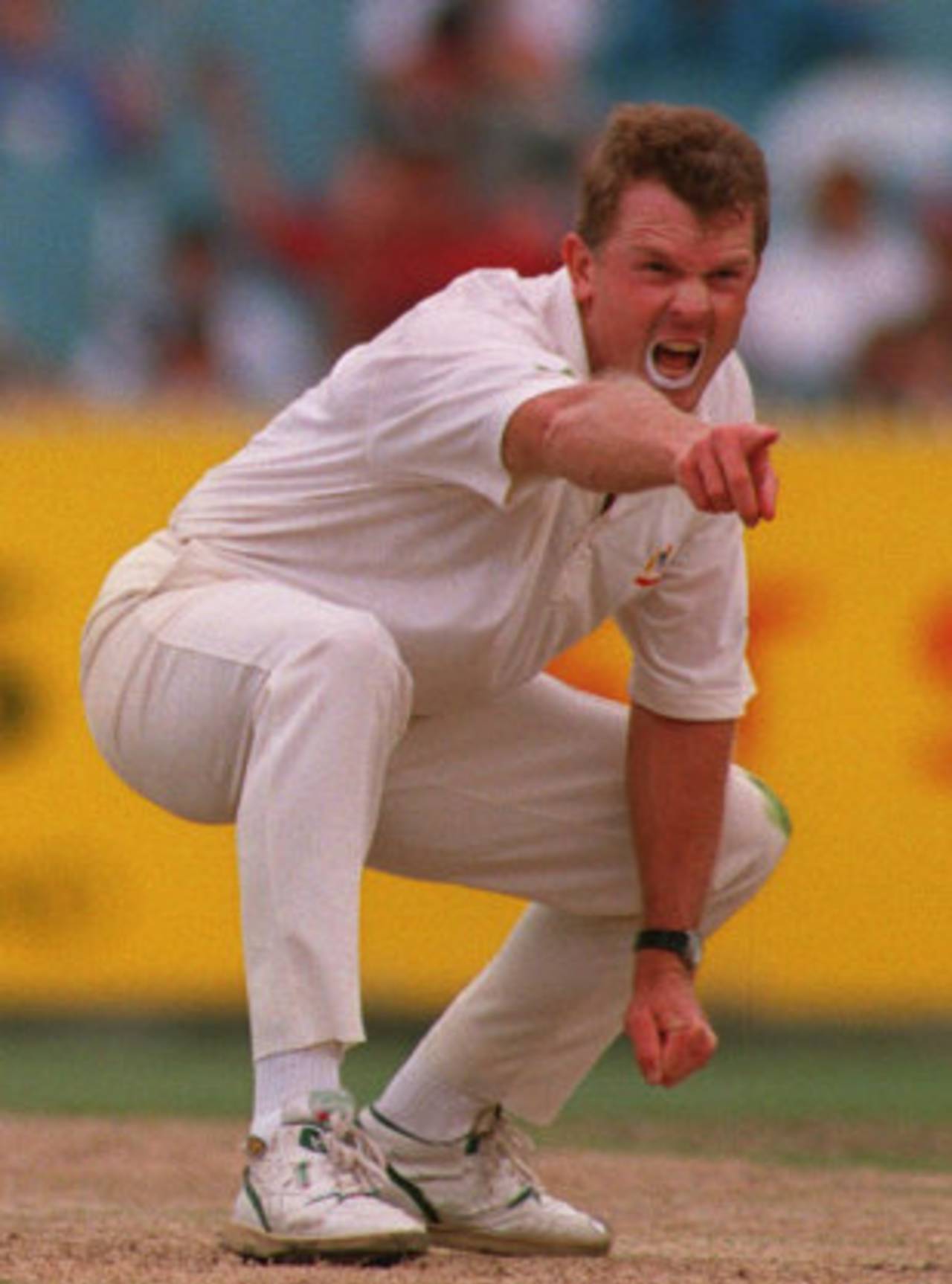McDermott brings empathy to the job
Australia's new pace bowling coach Craig McDermott believes empathy can be his most valuable addition to the dressing room, after a career he admits had plenty of "bad days at the office"
Daniel Brettig
17-May-2011

Craig McDermott knows all about the pressures of being an international bowler • Getty Images
Australia's new pace bowling coach Craig McDermott believes empathy can be his most valuable addition to the dressing room, after a career he admits had plenty of "bad days at the office".
Handed a Test debut at 19 in 1984 and then shuffled in and out of the Australian team until he re-emerged at his fittest and most incisive to make a place his own in 1990, McDermott knows very well the range of emotions and anxieties that can grip a young player. He was appointed to replace Troy Cooley as the man to guide the current crop of fast bowlers while preparing the way for the next, and is in a pivotal role for a pace battery that was made to look very ordinary indeed during the Ashes.
"Everybody has a bad day at the office and I certainly had my fair share of bad days at the office when I was playing cricket," McDermott told ESPNcricinfo. "I was dropped a number of times, re-selected a number of times and then stayed in the team for a seven-year period straight towards the end, so I've been through all the roller-coaster stuff and you've got to have a plan A, plan B and plan C.
"We've got a number of young players in and around the team now and some young quicks who may get a guernsey over the next one or two years. So I think it's good to have somebody there who can actually talk them through the nerves and the butterflies in the dressing room where you walk in there for the first time and you're standing next to Ricky Ponting at 150 Tests. (For them) it's the opposite end of the scale there by a big margin.
"There's a lot of feelings and emotions to help those younger guys through, and even guys who've played 10 or 15 Tests, it's not a lot of games and they're still settling in; there are some things off the field that you can give them advice on."
Allan Donald was the most high-profile applicant for the job, but McDermott's coaching apprenticeship at Cricket Australia's Centre of Excellence gave him worthwhile knowledge of Josh Hazlewood, Mitchell Starc, and James Pattinson among others, all expected to push for Test spots in the near future. He has also spent time with Mitchell Johnson, Peter Siddle, Ryan Harris and Ben Hilfenhaus during the Ashes, and has "some ideas of my own" about their faltering progress during that series.
"I've had a little bit to do with most of the guys during the Test series against England before the first Test and on a couple of other occasions on very short camps and then in Bangladesh," said McDermott. "I've found it quite easy to fit back into the dressing room scene because I've been there before myself. It certainly has changed a little bit from when I was playing and it's all for the positive and I really enjoyed Bangladesh with the new squad and under a new captain.
"I think it's going to be a difficult period for Australia, we've got tough series, Sri Lanka, South Africa and then India out here, which all adds up to a tough summer. We've got our work cut out, but I'm sure if we do the work and execute correctly I've no doubt we can come up trumps."
Truism though it might be, hard work is a key to McDermott's coaching philosophy, because it was by that route that he pushed himself back into the Australian team and stayed there as the spearhead of the attack before Glenn McGrath emerged from Narromine. He was perhaps the first Australian cricketer to commit himself fully to the fitness regime of a professional athlete, and reaped handsome results whenever he wasn't struck down by freak injuries: a twisted bowel ended his 1993 Ashes tour, while a badly sprained ankle culled him from Mark Taylor's 1995 Caribbean triumph. McDermott isn't sure Australia's bowlers are as fit as they need to be, in order to avoid the fatigue that can blur the mind and cause the ball to be sprayed around.
"That becomes part and parcel of planning, the top of end of the game is actually more in the head than in the body," he said. "You've got to be physically fit no doubt, extremely fit to be a fast bowler for a long period of time, but certainly the mental side of the game, it is very important to be able to think batsmen out and spot their weaknesses, and to be able to execute your skills, being able to pursue those weaknesses in batsmen.
"It's okay putting one ball or two balls in the right spot, but you've got to do it 25 times in a row to build up pressure. Execution only comes with hard work and practice and being fit enough to be able to execute for long enough, you don't want to have fatigue come into it.
"I think we've got a number of players who can do that, we've just got to make sure we do the work and making sure we're physically fit enough to execute for long enough to create problems for batsmen. Glenn McGrath was strong, fit and bowled a lot of balls in the right spot, there's no secret to that. It's been no secret that's the way to get batsmen out since WG Grace."
Daniel Brettig is an assistant editor at ESPNcricinfo